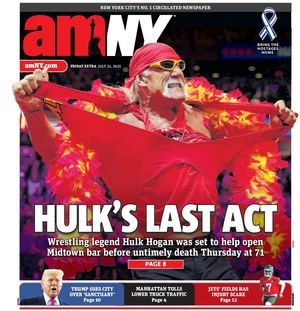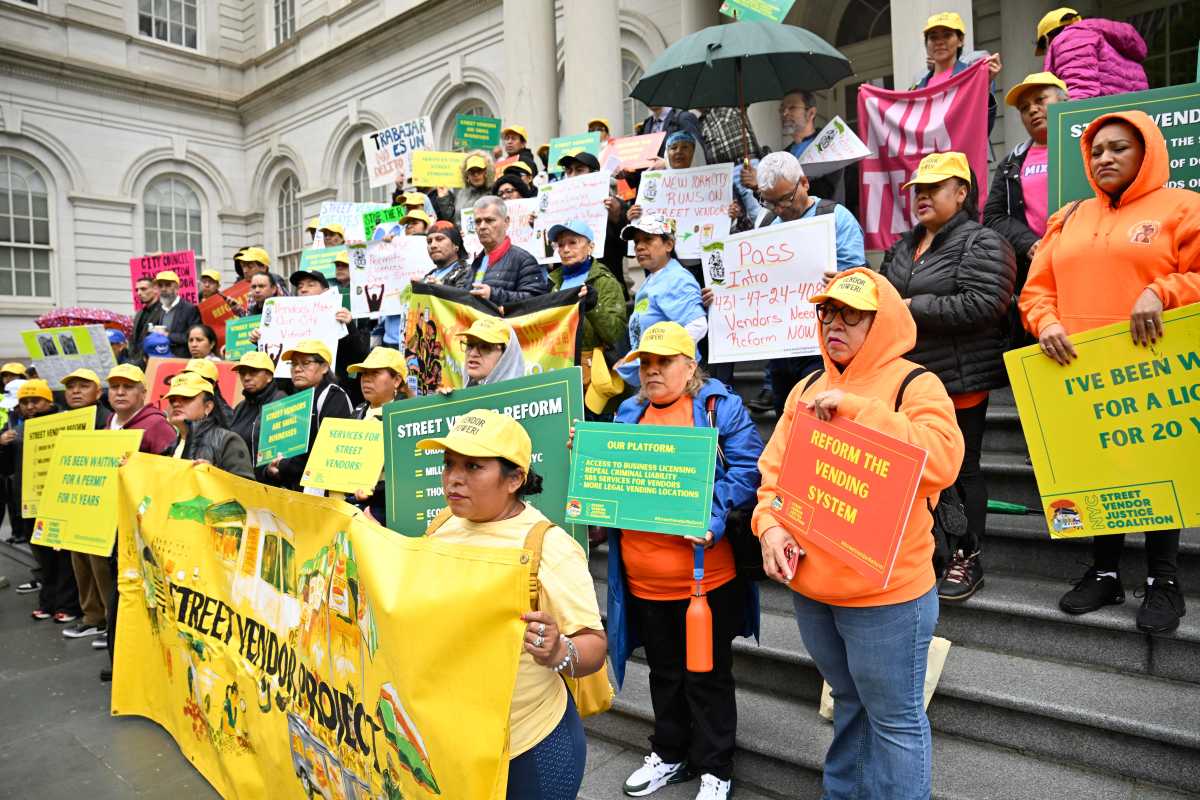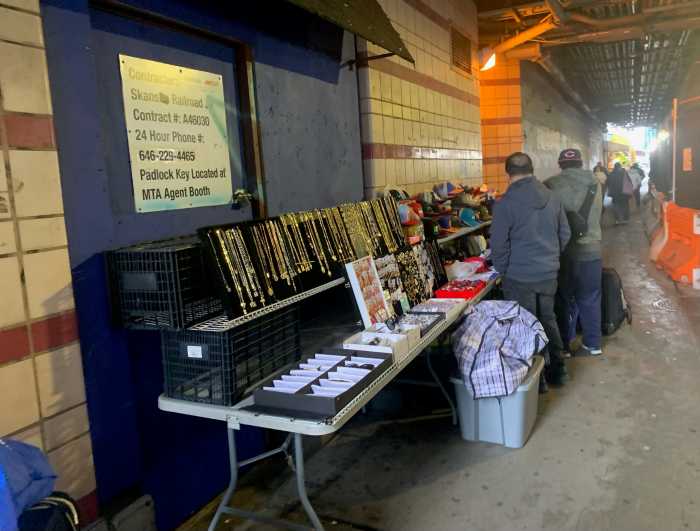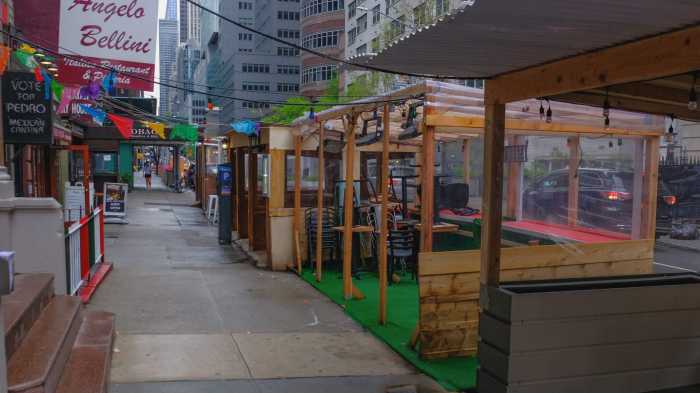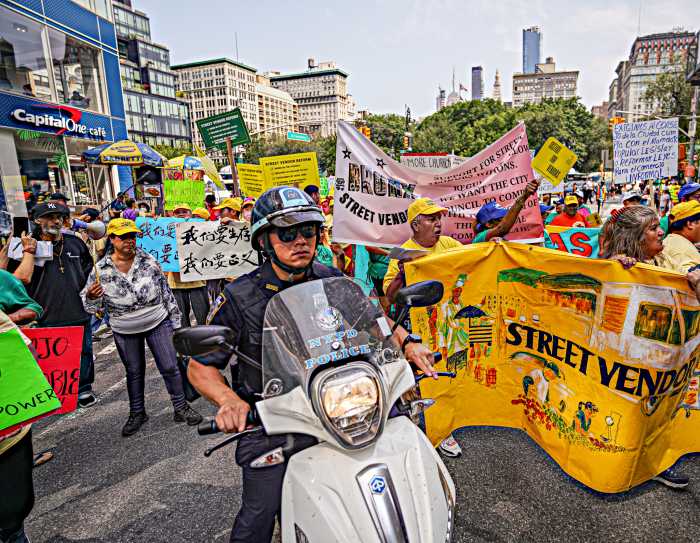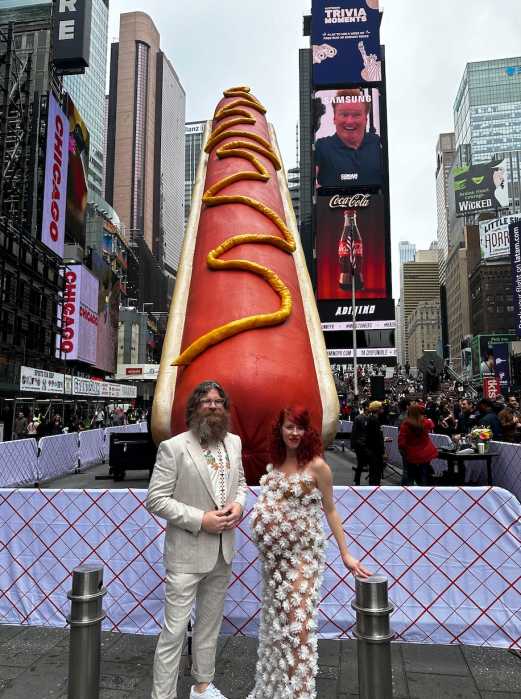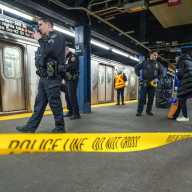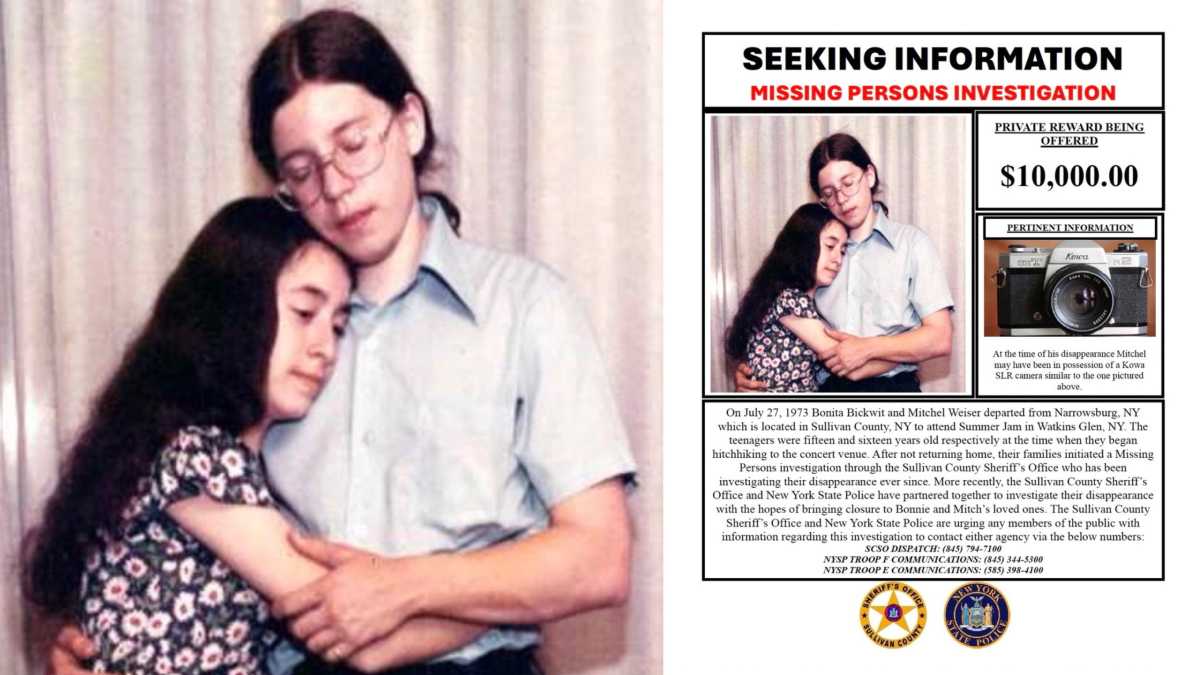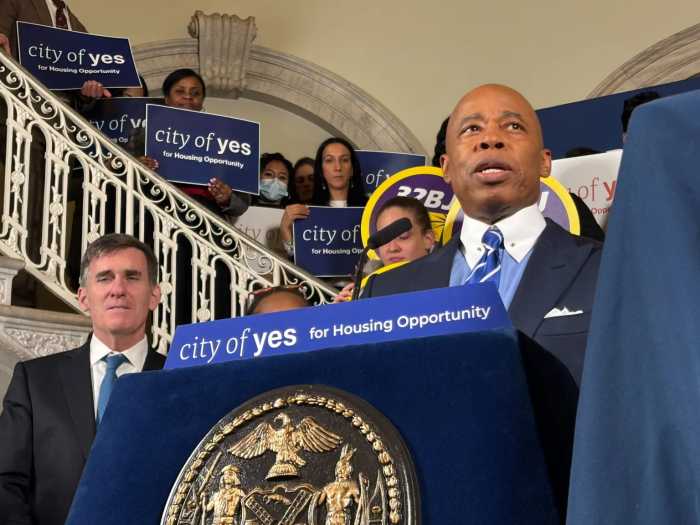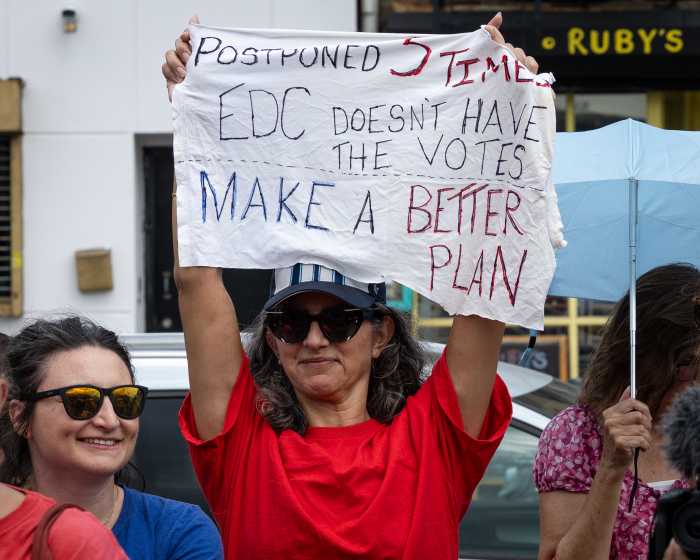More than 100 vendors, restaurant owners and other advocates took over the steps of City Hall on a rainy Tuesday morning, calling for a major overhaul of the city’s longstanding policies on street vending.
Activists from groups including the Street Vendor Project, elected officials and street-vendor supporters made sure that their voices were heard on May 6 to advance the Street Vendor Reform Package, which includes Intro 431, a bill that would increase the number of food vendor licenses and general vendor licenses available each year for five years.
Advocates also called for the passage of Intro. 408, which would require NYC’s Small Business Services (SBS) to provide a division focused on educational outreach to help vendors navigate the permitting process.
The group flooded the steps of City Hall in Lower Manhattan in advance of a City Council committee hearing on consumer and worker protection about the proposed legislation.
Bronx Council Member Amanda Farias is the prime sponsor of Intro 1251, a bill that is part of the Street Vendor Reform Package that calls for more food licensing applications each year. Pursuant to Local Law 18 of 2021, the city’s Department of Health and Mental Hygiene must make 445 supervisory license applications available to prospective mobile food vendors every year within a 10-year period from 2022 through 2032. Intro 1251 would expand the number of applications to ensure more licenses are given out each year.
“These are entrepreneurs, job creators, and culture bearers, but they’ve been trapped in a broken, discriminatory system for far too long,” Farias said. “Intro 1251 ensures the city fulfills its commitment under Local Law 18 by issuing real food vendor licenses, not just applications.”
Street vending licenses are nearly impossible to attain
NYC requires business owners to have a General Vendor License to sell goods or services in a public place that is not a store. But getting a permit is not easy.
The city caps general vendor licenses for non-veterans at 853, and food vendor permits at around 3,000. The waiting list to receive either license is in the thousands.
Some street vendors have been waiting decades to get legal permits — and they said Tuesday they don’t want to break the law to make a living.
“It’s been 35 years that I’ve been trying to get a license,” Calvin, a street vendor from Harlem who sells rings, hats, chains and similar items, explained. “It’s a major problem. I want to be able to support my family like anyone else. And I want to do it legally, not illegally.”
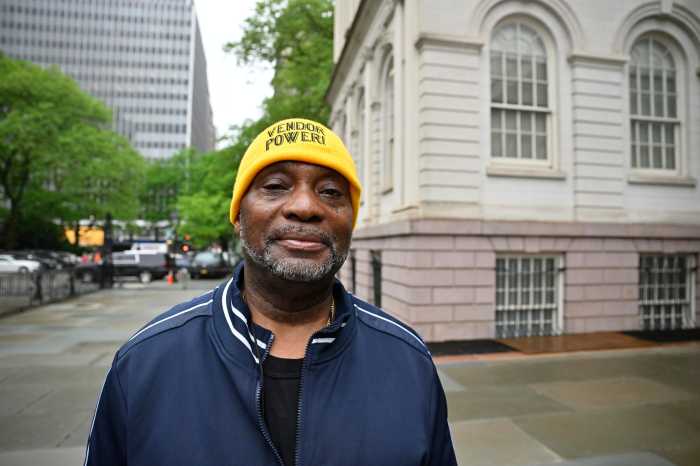
The Street Vendor Project says there are about 23,000 street vendors in NYC, most of whom are food vendors. About 75% of food vendors and 37% of general merchandise vendors are unlicensed.
Advocates attribute the unlicensing to the cap laws passed in 1979 and 1983, which limit the number of licenses the city distributes. Both advocates and some city officials have said that a lack of permits also leads to a lack of government regulation and oversight of vendors selling food and other goods.
Mohamed Attia, director of the Street Vendor Project, discussed the proposed legislation, saying it would be a triple win for the city, vendors and customers.
“We’ve seen incredible success in our community education outreach when we can equip vendors with information, tools and a clear path to follow, they know how to operate and can focus on what they love, making their food and serving their community,” Attia said. “Vendors are eager to work together with city leaders to modernize this system so it efficiently serves all New Yorkers.”
He also described how the system, as it is now, is “set up to fail” everyone. But Intro 431 would reform the process by gradually opening up licenses and permits, creating 1,500 new general vendor licenses and 1,500 new licenses for food vendors every five years.
“After that, the city will pretty much eliminate the waiting list; there will be no more waiting list, people can access the permits and licenses right away,” he explained.
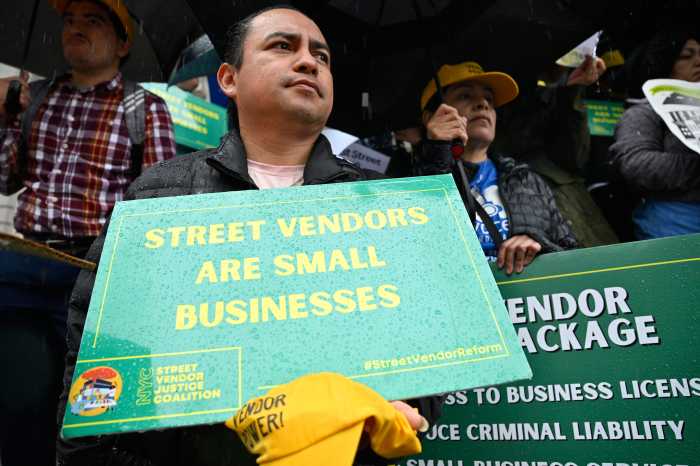
For many street vendors who speak English as a second language, securing the right permits and licenses for their sales becomes even more difficult on top of a complex system of rules and processes to navigate.
This is where Intro 408 comes in.
Public Advocate Jumaane Williams explained that the bill would establish a division with SBS to provide resources, training, and educational materials to street vendors to help them legally sell merchandise and food.
“These services are essential in keeping both street vendors and consumers safe,” he said.
Public opposition to illegal street vending
Many New Yorkers are supportive of the street vending reforms but commented that they have concerns surrounding it when it is done illegally.
New Yorker Margot Brie told amNewYork last month that she is most concerned about safety and whether vendors selling food are maintaining appropriate cleanliness standards.
“We have observed vendors cutting mangoes with the same knife and no water to clean it,” she said. “Also, vendors handle food and fruit with bare hands, sometimes sneezing into them or touching everything in sight. I’m amazed more people don’t get sick from all the bacteria and unsanitary conditions.”
According to NYC Department of Sanitation officials, the agency received 22,000 complaints last year about illegal vending.
The NYPD issued hundreds of summonses in the transit system alone during the first four months of the year.
“Vending within the transit system is unlawful, and the NYPD continues to address this condition through enforcement, which may include ejection, summons, and/or arrest,” a spokesperson for the NYPD’s Deputy Commissioner of Public Information said. “The NYPD has issued over 300 summonses this year for unlawful selling or soliciting in transit.
Mayor Eric Adams said during a Tuesday press briefing that community members have complained about too many illegal vendors setting up shops on local streets, including nearby businesses and shops.
“When we deal with vendor licenses, it’s coming from the community,” he said. “People don’t want to see a freefall in their community around vending. It is the community that called us when you saw the Brooklyn Bridge lined up with vendors.”
The mayor discussed why the permits have to follow a certain process with rules and guidelines in order to be fair to all business owners in the city.
“We must have a fair vendor system, but it can’t be a free-for-all,” Adams said. “So, those who are saying, ‘Just give vendor licenses to everyone, we’re not going to do that. We’re going to monitor, make sure it’s done correctly and it has to create the atmosphere that businesses are thriving in the city.”
Possible economic benefits
Meanwhile, researchers at the city’s Independent Budget Office estimated that eliminating the cap on street vendor permits and licenses could have a net revenue impact of $59 million to the city’s budget each year.
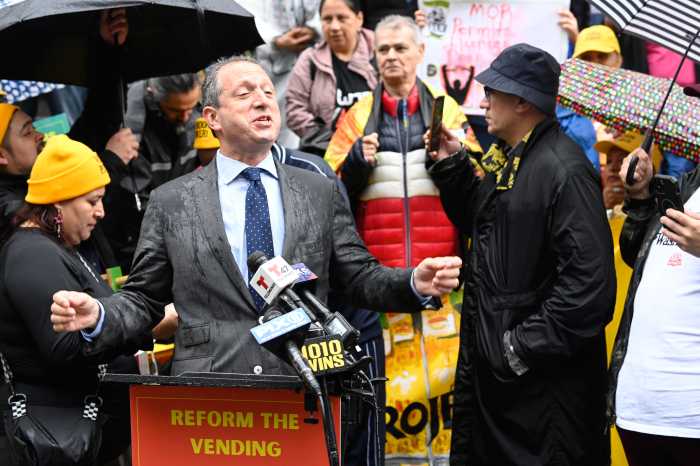
City Comptroller Brad Lander, a mayoral candidate this year, doubled down on the positive impact legal street vending has on the economy, adding that he supports the entire reform package.
“If we issued licenses to all the street vendors currently on the wait lists, New York City would generate nearly $60 million revenue,” he said. “We must address the structural issues at the root of this problem, bringing us towards creating a functioning regulatory system, ensuring our public spaces are clean and accessible and helping our smallest businesses to stabilize and flourish.”
